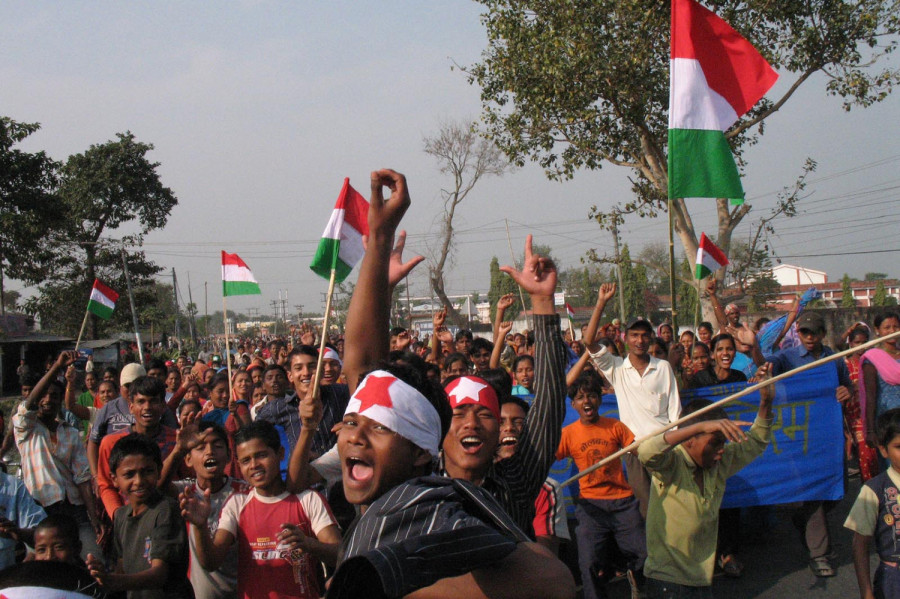Columns
Do we need nationalism or patriotism?
When people feel they must choose between them, nationalism customarily proves more potent.
Bina Jha
Nationalism and patriotism are a problematic pair. Often used interchangeably, both are in fact, quite different in meaning. American analyst Alex Nowrasteh describes nationalism as the love of the country combined with a dislike of other countries, their peoples or their cultures. Nationalism even extends to the dislike of fellow citizens who are not similar to them. However, patriotism is a feeling of devotion and a commitment to sacrifice for nation-building with cultural tolerance, a realisation of weaknesses and acceptance of the existence of others.
Nationalists who share a common history, culture and origin always believe that their country is the best. They refuse to accept any weaknesses of the nation, and explain everything, including the flaws, as a matter of pride. Nationalists support nation-building campaigns to assimilate all citizens from diverse cultures into a state-determined norm, national language and national dress to show uniformity.
In Nepal, the concept of nationalism has been a conflicting issue since forever as Madhesis and Janajatis experience exclusion from the policy level to the implementation part. There are three types of sub-nationalism—Madhesi nationalism, Pahadi (Khas) nationalism and ethnic Janajati nationalism. However, the nation is representative only of Pahadi nationalism, as claimed by the other two sub-nationalist groups.
Nationalists are competitive, militaristic, aggressive and prejudiced towards other nationalist groups. So, it is a cause of discrimination and conflict. Nationalists tend to maintain stereotypical thinking and lead to exclusion and human rights abuses of minorities, ethnic violence, terrorism, and ultimately, war. The exclusion of Madhesis, Janajatis and other minority groups can be explained on the basis of this statement.
For people such as the Japanese, who possess their own ethnically homogeneous nation-state, and for people such as the French, who are culturally and politically preeminent in a state, even though other groups are present in significant numbers, the fact that nationalism and patriotism are two different phenomena is usually of little consequence. But in a world containing thousands of ethnonational groups and almost 200 countries, it is evident that, for most people, the sense of loyalty to one's national group and one's state does not coincide. Very often, these two loyalties compete for the allegiance of the individual.
Nationalism and patriotism are vitally different phenomena, and should not be confused through the careless use of language. A comparative study between them shows that when the two loyalties are perceived as being in irreconcilable conflict, that to say when people feel they must choose between them, nationalism customarily proves more potent. One of history's most vivid illustrations of the relative strength of these two loyalties is the disintegration of the Soviet Union. A sense of loyalty to the Union of Soviet Socialist Republics was no match for the sense of nationalism demonstrated by nearly all the peoples of the erstwhile Soviet Union, including even the Russian nation. Events within the former Federal Republic of Yugoslavia certify that Albanian, Bosnian, Croatian and Slovene nationalism has each proven itself far more potent than Yugoslav patriotism.
Patriotism is commonly enlisted in the service of nationalism, but it can also be a force in the opposition direction. It can indeed be a lever that redirects nationalism. The patriot may see, for instance, that a war that nationalists would wage goes against the ideals of the country. Patriotism can produce national self-criticism or national embarrassment as well as national pride. English writer Samuel Johnson described patriotism as the last refuge of a scoundrel. Patriotism represents devotion to the principle of a national spirit. In every lexicon, patriotism is defined as 'love of country'.
Indian professor Niraj Gopal Jayal explains nationalism and patriotism in the ideas of Tagore and Gandhi, which turns quite substantially on the contrast between patriotism and nationalism. Nationalism is an ideology while patriotism is a sentiment; nationalism is statist, patriotism is not; nationalism gives primacy to national identity as represented in and by the state while patriotism expects the state to serve the needs of society and culture, nationalism is subject to the anxieties of ideology, especially insecurity about the nation, while patriotism is assumed to be free of such anxieties and insecurities.
These contrasting features lead two attributions of political significance: The first that patriotism is more inclusive and accommodative of plurality than nationalism, which is by definition intolerant of these; and second, that patriotism is naturally comfortable with civil society, while the central motif of nationalism is the Hegelian state of nationalism. Now the question is whether we need nationalism or patriotism for Nepal's prosperity.




 8.26°C Kathmandu
8.26°C Kathmandu















